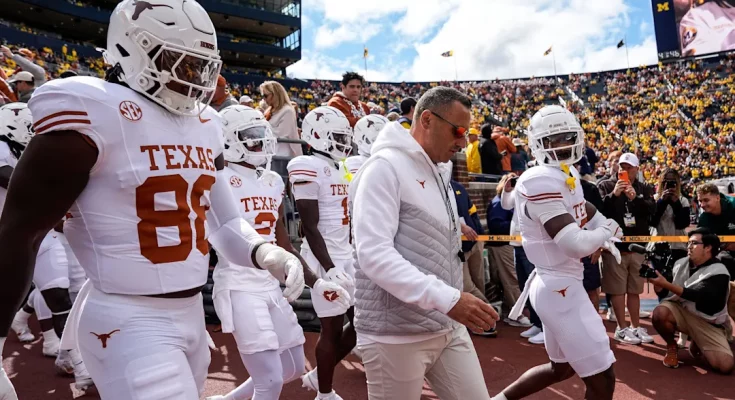Three Questions Texas Longhorns Will Need Answered to Win National Championship
The Texas Longhorns enter the 2025 college football season with a level of expectation not seen since the glory days of Vince Young. After two straight College Football Playoff semifinal appearances and a return to national prominence under head coach Steve Sarkisian, the Horns are no longer hunting contenders—they are one. With an offense powered by former No. 1 overall recruit Arch Manning and a defense stacked with veteran experience and young stars, Texas has the roster, coaching staff, and pedigree to win its first national title since 2005.
But talent and potential don’t win championships. Teams that hoist the trophy in January do so because they’ve answered the critical questions that define championship campaigns—resiliency, balance, and execution under pressure. For the Longhorns, three major questions stand between preseason hype and actual glory. These aren’t minor tweaks or speculative concerns; they are program-defining challenges that will determine if this talented Texas team can finally complete the journey and reclaim its seat atop college football.
There may be no single player in America under more scrutiny than Arch Manning. As the face of Texas football and the most famous surname in the sport, Manning carries enormous pressure into the 2025 season. Last year, he showed flashes of brilliance in limited action—completing 61-of-90 passes for 939 yards, 9 touchdowns, and just 2 interceptions, along with a stunning 67-yard touchdown run that drew comparisons to Vince Young. But spot duty is one thing. Leading a national title contender for a full season is another.
To lead Texas to a national championship, Manning won’t just need to be good—he’ll need to be elite. The Longhorns have loaded their offensive arsenal with talent: the receiving corps includes playmakers like Johntay Cook II, Isaiah Bond, and DeAndre Moore Jr., while the running back room is among the most versatile in the country. The offensive line is experienced and deep. Everything is in place for Manning to thrive.
Still, the key lies in how he handles pressure—not just in hostile environments, but when the game slows down in late November and every throw is under the microscope. His uncles Peyton and Eli understand better than anyone the burden of expectations, and Arch appears to be following in their footsteps in terms of maturity and preparation. But leadership, emotional toughness, and performance in the biggest moments will define his season.
In the SEC gauntlet, where every week can be a war, Manning’s decision-making, composure, and ability to lift his team will be tested repeatedly. Can he be the guy who makes the play on 3rd and long in the fourth quarter with the season on the line? Can he outduel Georgia, Alabama, or Ohio State under the brightest lights? If the answer is yes, Texas has its next great quarterback—and likely, its next great championship team.?
Texas’ defense in 2024 took major steps forward, evolving from an inconsistent unit into one capable of stalling explosive offenses. Under defensive coordinator Pete Kwiatkowski, the Horns were physical, disciplined, and disruptive, especially up front. They finished in the top ten nationally in run defense and held several elite offenses to below-average production. But championship defenses don’t just have good stats—they dominate when it matters most.
The 2025 season will demand even more. With the transition to the SEC in full effect, Texas will face a weekly schedule filled with NFL-caliber talent and coaching. The defense must not only maintain its level of play, but raise it—particularly in terms of pass defense and closing out games.
Key returners like edge rusher Ethan Burke, defensive tackle Alfred Collins, and linebacker Anthony Hill Jr. will anchor a front seven capable of controlling the line of scrimmage. The question lies in the secondary, where Texas must replace multiple starters and integrate younger players into high-stakes roles. Talented freshmen like Xavier Filsaime and veterans like Jahdae Barron will be expected to elevate their play to match the physicality and speed of SEC offenses.
Third-down defense, red-zone stops, and takeaways—these are the metrics that define championship units. Can Texas’ defense force turnovers against elite quarterbacks? Can they shut the door with a lead late in the fourth quarter? Can they dominate in the trenches for four quarters, not just in spurts? The answers to those questions will determine whether Texas can win games when the offense sputters or the weather turns rough.
If the defense becomes the kind of unit that not only contains opponents but crushes their spirit, Texas won’t just be a championship contender—they’ll be the favorite.
Perhaps the biggest unknown for Texas heading into 2025 is how the program will handle its full-time transition into the Southeastern Conference. While Texas has long recruited at an SEC level and boasts the infrastructure of a blue-blood program, the week-to-week grind of SEC football is unlike anything the Longhorns have experienced in the Big 12.
There are no off weeks. There are no soft matchups. Even mid-tier teams like Kentucky, Arkansas, and Mississippi State are capable of pulling off upsets in hostile environments. The margin for error is razor thin. One missed tackle, one failed fourth-down conversion, one special teams mistake can be the difference between making the SEC title game—or watching it from home.
Texas’ 2025 schedule is daunting. They open the season against defending national champion Ohio State in Columbus—a game with major playoff and perception implications. Then come battles against Georgia, Alabama, Texas A&M, Ole Miss, and Florida. There’s also the annual Red River Showdown against Oklahoma in the Cotton Bowl. It’s a schedule that would challenge even the most seasoned championship team.
The Longhorns must learn to win ugly. They must win in bad weather, in front of hostile crowds, and when things don’t go according to plan. Sarkisian’s team has made great strides in mental toughness over the past two seasons, but navigating a perfect or near-perfect season in the SEC requires championship-level resilience.
Depth will also be a deciding factor. In the SEC, injuries are inevitable. Texas has done an outstanding job building depth across key positions, especially on the offensive and defensive lines. But will backups be ready when starters go down in November? Will young players be able to contribute meaningfully in critical moments?
Championship teams don’t just win shootouts—they win slugfests. They survive adversity. They don’t beat themselves. Texas has the talent to win every game on its schedule. But they must prove they have the maturity and focus to avoid letdowns. One loss in the SEC doesn’t end playoff hopes—but two likely will. And if Texas wants a shot at the national title, they must get to Atlanta first.
Texas has every reason to believe this could be the year. They have a generational quarterback in Arch Manning, an experienced coaching staff, a top-tier roster, and momentum built over two years of steady progress. But championships are earned, not awarded based on potential.
The 2025 Longhorns will have to answer these three questions not just with talk, but with action. Can Arch Manning rise to the occasion and carry the weight of expectation? Will the defense become an elite unit capable of smothering the nation’s best offenses? And can the team survive the weekly trials of SEC play without a season-crippling stumble?
If the answers are yes—if the team is as tough mentally as it is talented physically—then the dream that’s lived in Texas fans’ hearts since 2005 could finally come true again.
Because this time, it’s not just about being back. It’s about finishing the job.



